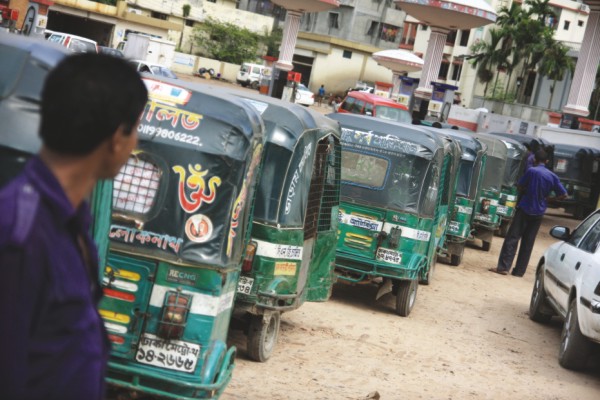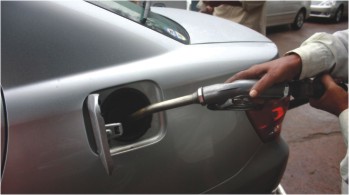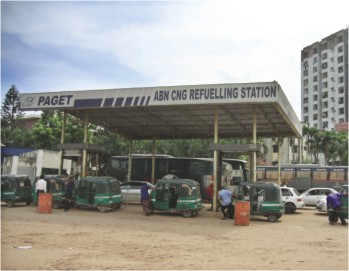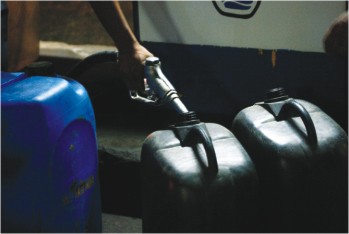 |
||||||||||||
Energy roadmap - an illusion?--M. Tamim Providing electricity to people--M. Asaduzzaman For a national rapid transit system--Tanvir A. Khandaker Gas crisis: Sustainable solutions -- Ridwan Quaium Solar Bangla to Shonar Bangla -- Salahud Din Ahmed Transport infrastructure: Altering its skewed pattern -- Tawfique Ali Sustainable environment: Challenges ahead -- Pinaki Roy Bangladesh's role in climate negotiations -- Dr. Atiq Rahman Climatic signals on development antenna -- Dr. Dwijen Mallick Major disasters and management issues -- Mahbuba Nasreen
|
||||||||||||
 |
||||||||||||
Photo: Amdadul Huq/Driknews |
||||||||||||
Gas crisis: Sustainable solutions Ridwan Quaium Prior to year 2000, most vehicles in Bangladesh were used to run on petroleum. Since crude oil is not a natural resource that is found in Bangladesh, the Bangladesh Government had to import it. The issue is that as the international demand for crude oil is always higher than the supply, the price of crude oil is always expensive. This makes the price of petroleum very expensive too. As Bangladesh is a poor nation, the mass population could not afford petroleum at the international market price. As a result, the Bangladesh Government had to heavily subsidise petroleum to keep the transportation cost low. The government had to spent some portion of the national budget to subsidise petroleum. For this reason many important development projects could not take place due to lack of financing. Many people opposed this idea of subsidising petroleum but the government had no other feasible solutions because as stated before that would drive up transportation costs and transportation costs is related to poverty alleviation. Thus, if the government is not able to keep the transportation costs affordable then that might have an adverse effect on the economy. Other than the price issue, petroleum also had a negative impact on the environment. The air pollution in Dhaka during the 1990's reached high levels by global standards. Air pollution impacts our health as well as health care costs and also our productivity. Thus, one can see that the use of petroleum is not economically and environmentally sustainable due to its negative impact on our economy, environment and health. Luckily, an alternative solution to petroleum was found to run our automobiles during year 2000, which is compressed natural gas also known as CNG. CNG revolutionised the transportation system in Bangladesh. One of the major advantages was that it is a natural resource that could be found in Bangladesh. Since, it was found in the country, it was cheap too. As a result, the demand for petroleum decreased and the government had to import less petroleum than before reliving a big burden from the budget. The cost of transportation decreased as well, which made transportation more affordable for the poor. Another advantage was that CNG was far more environmentally friendly than petroleum. Studies show that CNG operated vehicles produce around 10-20% carbon dioxide, about 25% less nitrous oxide and about 80% less carbon monoxide and other smog-forming emissions than vehicles that run on gasoline. These two advantages prompted the government to encourage the citizens to run their vehicles using CNG instead of petroleum. Since, the price of CNG was much cheaper than petroleum, the citizens happily accepted the offer. Vehicles that originally operated with gasoline had to be converted in a CNG conversion shop so that it could run on CNG. Just in Dhaka alone there are now about 56 CNG conversion outlets. In addition, some 90 CNG refueling station was established in Dhaka to meet the demand for CNG. These CNG conversion shops, refuelling stations and other businesses related to CNG created about 10,000 jobs.
Judging the above benefits of CNG one can conclude that since, CNG has made a positive impact on the economy and the environment there is no issue with running vehicles on CNG. However, since after all CNG is a non-renewable energy source and since it is a natural resource, despite all the benefits, the use of CNG to run vehicles is not sustainable. Unfortunately, as most things in Bangladesh are done without a vision and without considering the long-term impacts, the government failed to realise that CNG is a natural resource. The government without having any information about how much natural gas there is actually in Bangladesh, without having any knowledge about how much natural gas the country can produce or without analysing how it might affect other sectors that uses natural gas kept on providing license to start up CNG conversion shops and CNG refuelling stations one after another. This has created a crisis for natural gas in the country, as the demand for natural gas is now more than the amount of gas that is being produced. Most of the power stations in Bangladesh produce electricity by using coal and natural gas as an input. Bangladesh has a power crisis for many years. Due to massive corruption in the power sector and due to an exponential demand for power in the recent years, the power situation instead of getting any better is actually becoming worse day by day. To make matters worse, now the power stations are not even getting the necessary amount of natural gas it needs to produce electricity according to its capacity. Some of them had to be even shut down. This is greatly reducing the production of electricity in the country and also the production of other industries, as those industries require electricity to run its factories. Studies show that factories are producing only 30-40% of their capacity due to lack of electricity. This is affecting our exports greatly and above all our economy. Natural gas is also used for cooking. Due to the crisis for natural gas, it has become hard for residents of many areas in Dhaka and around the country to cook as they only receive gas during certain hours of the day. This is impacting the quality of life of the citizens. The low cost of operating vehicles due to the low price of CNG has made it more affordable for people to operate cars. Besides the rise of the middle class, this is another reason why the number of vehicle ownership is increasing rapidly in Dhaka City. This has increased traffic congestion in Dhaka more than ever before which is having a negative impact on the economy. Thus, the lack of a long term plan about the usage of natural gas, has created a crisis for natural gas in the country, has decreased our electricity production, has decreased our exports, has negatively impacted the standard of living and has increased traffic congestion. Since, it is not possible to drastically increase the production of natural gas to solve the natural gas crisis issue, the government has ordered CNG refuelling stations to not operate for six hours during the day. To make life a little more convenient for the citizens, the CNG refuelling station owners agreed to this idea during the month of Ramadan. However, now they have decided to go on strike unless the government takes off the order.
From a national perspective, one can say that the CNG refuelling station owners are acting unjustly. They should be patriotic and cooperate with the government by not operating their pump stations for six hours during the day. However, from the CNG refuelling station owners' perspective, they are doing nothing wrong by wanting to keep their stations open as long as they want to because it is the government who provided them the license to do business in the first place. Thus, the government cannot now all of a sudden tell them not to operate business for six hours because that would make it hard for them to make any profit or even to stay in business. If the government did not motivate them to open the CNG refuelling stations, then the CNG refuelling station owners could have used this money to open some other type of businesses. There are other sectors too who are being negatively impacted due to this six hour closure of CNG pump stations. Auto rickshaws that run on CNG are one of the major modes of transportation in Dhaka city. These auto rickshaws are also being greatly affected by this six-hour closure of CNG pump stations because now they are unable to operate the whole day, as they cannot take gas whenever they want to. Their operation hours have decreased because if they run out of gas while the pump stations are closed they have to wait for the pump stations to reopen to refuel and start operating again. In addition, when the pump stations are open, they have to wait in long lines to refuel, again limiting their operating hours. To compensate for these loss hours, the auto rickshaw drivers are charging passengers two three times more than before. Many city buses also currently run on CNG to lower their operation cost. However, the natural gas crisis has also prompted them to increase their ticket price to compensate for the hours that they cannot drive and spend on the long lines at the CNG pump station. As the poor and the middle class people use the buses and the auto rickshaws, this increased bus ticket price and CNG fare price is impacting their lives too. Thus, even though at the beginning the use of CNG lowered transportation cost, the uncontrolled use of CNG, now has increased transportation cost in Dhaka city for people who use the buses and the auto rickshaws. A lack of long term plan about the usage of CNG has now put the government in a very awkward position. Even though, it is not the best solution but at this moment the best way to damage control the situation is that the government can either ban the use of CNG in private vehicles or increase the tax on CNG for private vehicles in such a way that it becomes more expensive than petroleum. The tax on CNG for auto rickshaws, buses and other public transport will remain unchanged. This will be a very bold move because it is likely to create a huge uproar from many private car owners who operate their vehicles using CNG. They may most likely not support this idea as it will increase their operating cost and also they may argue that they have spent a lot of money to convert their vehicles to make it CNG operable. In addition, they may argue that to help improve the air quality, they want to use CNG instead of petroleum. Businesses related to CNG will also oppose this idea, as this will decrease their customer base. Despite, the fact that this is going to be an unpopular move, this move is far better than the current approach of shutting down CNG pump stations for six hours. This is because in the current approach the poor and the middle class are being affected but in the proposed move the upper class and the upper middle class will be affected. To ensure socio-economic sustainability it is better to do something that negatively impacts the well-to-do than the people who needs to be given a little more care. To alleviate poverty, it is a better idea to reduce the transportation costs for the poor than the upper class.
Furthermore, this increased operating price of personal vehicles will certainly lower the number of trips made by personal automobiles. It may also reduce the rate of increase in automobile ownership in the city. As a result, this approach will help to reduce traffic congestion, which is greatly impacting the economy and reduce the amount of natural gas that is being burnt by vehicles that are stuck in traffic for hours. One can argue that, this approach will prompt personal vehicle owners to switch back to petroleum, which will again impact the national budget and the air quality. However, this time the government should charge personal vehicles the international market price for petroleum instead of subsidising to lower the costs. Thus, it will not impact the national budget like before. This will too help lower the use of personal automobile, which will reduce congestion. In the short run it may increase air pollution but the ultimate goal of the government, which should be to limit not just the use of personal automobiles but to limit the use of any type of motorised vehicles should improve the air quality. Even the use of bus transit should be decreased in the long run because after all these are using non-renewable resources and hence are not sustainable. The vision of the government should be to develop a green and liveable city by increasing the modal share of non-motorised transports such as walking and biking by constructing continuous safe and convenient sidewalk and bike paths/routes in the city. This will mitigate some of the energy crisis issue and make the city economically, socially and environmentally sustainable in the long run. Ridwan Quaium is a Civil Engineer, currently pursuing a Master of Urban Planning Degree, A&M University, Texas. |
||||||||||||


